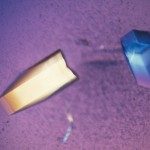Link to Pubmed [PMID] – 19232450
Eur J Med Chem 2009 Jun;44(6):2497-505
We previously reported the synthesis and the antimycobacterial activity of 4-(7,7-dimethyl-7H-furo[3,2-f]chromen-2-yl)pyridine. From this result, we sought to design simple synthetic accesses to related structures allowing the preparation of a diverse set of analogues. Two approaches were investigated. From 3-(2-bromo-7,7-dimethyl-8,9-dihydro-7H-furo[3,2-f]chromen-1-yl)propyl acetate, we prepared 2-arylated derivatives via Suzuki-Miyaura reactions between this bromine-bearing compound and various arylboronates. Moreover, and even more simple, we prepared the ((6-hydroxy-2,2,7,8-tetramethylchroman-5-yl)methyl)triphenylphosphonium salt via a selective bromination of 2,2,5,7,8-pentamethylchroman-6-ol. From this salt, a two stage Wittig reaction with an array of activated acids allowed the quick preparation of many analogues. The biological evaluation of the effect of these compounds on the growth of Mycobacterium bovis as well as Mycobacterium tuberculosis pointed out a fourfold improvement of the antimycobacterial properties for one of the compounds made. However, the many analogues which inhibited the growth of M. tuberculosis in the 0.6-5 microg/mL range turned out to be also cytotoxic on VERO cells growth at the same concentration range.

